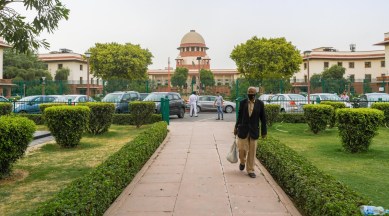The Supreme Court on Monday referred to a five-judge Constitution Bench the petitions seeking legal recognition to same-sex marriages, saying the matter raises questions of “seminal importance”.
In its order, a three-judge bench, headed by Chief Justice D Y Chandrachud, said the submissions on the issue involve the interplay between constitutional rights and specific legislative enactments, including the Special Marriage Act, besides the rights of transgender couples.
“Having due regard to the broader context of the petitions…and the interrelationship between the statutory regime and constitutional rights, we are of the considered view that it will be appropriate if the issues raised are resolved by a Constitution Bench of five judges of this court having due regard to the provisions of Article 145(3) of the Constitution,” the bench said.
Under Article 145(3), a minimum of five judges should hear cases that involve “a substantial question of law as to the interpretation” of the Constitution.
The bench, also comprising Justices P S Narasimha and J B Pardiwala, listed the matter for hearing on April 18.
The government has opposed the petitions and urged the Supreme Court to leave the issue to be decided by the Parliament. It has told the top court that a “legislative understanding of marriage in the Indian statutory and personal law regime” refers only to marriage between biological men and women and that any interference “would cause complete havoc”.
Any “recognised deviation…can occur only before the competent legislature”, the government submitted, adding that same-sex marriage cannot be recognised by law “despite the decriminalisation of Section 377 (homosexuality)” of the IPC in Navtej Singh Johar v. Union of India.
Story continues below this ad
Appearing for the Centre Monday, Solicitor General Tushar Mehta said “nobody is interfering” with “the right to love, the right to express, and freedom of choice” as laid out in the Navtej Singh Johar verdict.
But, he pointed out, the top court was also “very, very careful” in saying this ruling “should not be meant as conferring any right including the right to marriage.”
“When the question of granting recognition, legal sanction to a relationship is concerned, that is essentially a function of the legislature, and for more than one reason,” Mehta said.
“Parliament will have to debate and take a call whether in view of the societal ethos and several other factors which go into the lawmaking, whether we would like this institution to be recognised…”
Story continues below this ad
Mehta said that the Centre’s affidavit mentioned existing provisions in various laws dealing with marriage that specifically relate to only biological men and women and that the laws would become otiose if same-sex marriage is legalised.
Countering this, Senior Advocate Abhishek Manu Singhvi, who appeared for some of the petitioners, said it is about “the right to love that the SC explained in its judgment decriminalising same-sex relations is the right that makes us human”.
He said the consequential issues which follow from the decriminalisation of Section 377 is that “the right to marry cannot be withheld from a class of persons solely on the basis of their sex, sexual orientation or gender identity”.
He said that “in the event the right to marry is extended to such classes, then it should be extended in equal terms”.
Story continues below this ad
The senior counsel contended that the court must also consider striking down the requirement of prior notice period for those intending to get married under the Special Marriage Act.
Senior Advocate N K Kaul, also appearing for some petitioners, said the Special Marriage Act speaks about marriage between any two persons.
He said that in the Navtej Singh Johar verdict, the SC “categorically said that the right to life includes dignity and choice of family, marriage, procreation and sexual orientation and it inheres in every individual including the LGBTQ community”.
“In the Puttaswamy case, the SC said same-sex couples enjoy the right to privacy in making vital personal choices specifically including the right to marry.
Story continues below this ad
In Deepika Singh, the SC said unconventional manifestations of love and family by same-sex couples equally deserve protection under law and benefits under various legislations,” Kaul said.
“If we holistically look at all these judgments, the rights that your lordships have recognised of same-sex couples and the community, are far beyond a narrow pedantic interpretation sought to be given to the Special Marriages Act by saying that in one paragraph, male and female is used,” he said.
Senior Advocate K V Viswanathan said the petitions directly engage Article 19 (a) and 21 of the Constitution.
“The right to choose a partner and have the status of marriage is actually a right of expression, right to dignity and self respect which are traceable to Article 21.
Story continues below this ad
These rights will have to be recognised and statutes suitably tailored to give them this recognition because these have other implications like inheritance, family pension etc,” he said.
Senior Advocate Menaka Guruswamy, who also appeared for the petitioners, said “the legislative intent of the Hindu Marriage Act requires that same-sex marriage be recognised, because Section 5 of the Act speaks of marriage between two Hindus”.
She said that “when Ambedkar presented this, the objections he received on inter-caste marriage, widow remarriage etc. were similar to what the Solicitor General is saying now”.
